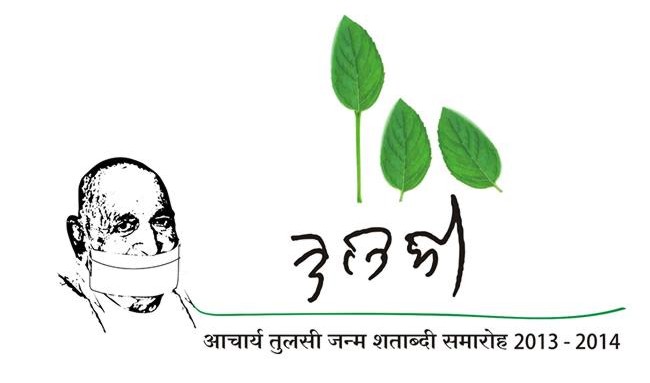
Terapanth Professional Forum

Acharya Tulsi Birth Centenary
Organizations or companies or corporations -whatever name we may call them and whatever size they may be, they are clearly playing an increasingly bigger role in the world and in our lives. This may sound like a dramatic statement but today's world with its large populations, complex and interconnected global economy has necessitated the evolution of large organizations.
Managing these organizations is a sophisticated iask and as the approach to management has evolved, the world has seen management "gurus" who have provided newer and more sophisticated approach to running the organizations and have also run them It's the CEOs and business school professors who are called management gurus. Think of a Jack Welch (ex-CEO of GE), a Ratan Tata (Tata Group Chairman) or a CK Prahlad (Prof, of Strategy) and a Michael Porter (Prof, of Strategy).
They all and many more such people have done really well. But none probably faced the same kind of challenges that a sadhu faced at the age of 22 when he took over the leadership of a 200+ year old organization with over 1000 people who have committed their lives to the sangha (organization). And then over a period of 50 years transformed the organization and through it, the lives of millions of people across the country and overseas. This is an organization where there are no promotions, no P&Ls, no bonuses - no material "carrots" to "motivate" people.
Gurudev Tulsi had many approaches in leading and transforming the Terapanth sangh and also the country.
Leadership and vision: Gurudev provided a clear vision and strong leadership since the time he took over. [Is there a story we can provide? When Gurudev took over he was very young, so he may have had to spend time taking care of the uncertainty in Terapanth]
The Terapanth sangh grew and prospered under him.
A management guru has the ability to understand patterns and translate them into an action plan. Gurudev Tulsi showed a unique ability to understand the changes that were happening in the society and the world at large. Women were getting empowered, industrialization and technology were changing the world, consumption and greed were increasing and the whole world was getting more interconnected.
Gurudev Tulsi understood these and probably more and became the visionary and the execution force behind several transformative things - Saman order, Anuvrat, etc.
One of the limitations of Jain sadhus, in the context of today's world, is that they do not use any kind of transportation. That has meant that the broader world hadn't heard much about the deeply scientific and universal message of Jainism. Gurudev Tulsi turned this into a unique opportunity and launched the order of "samans" and "samanis". These were people who were given a different level of monk hood, with certain restrictions removed for them - especially related to using transport including taking commercial flights. This was a transformative move that suddenly allowed the learned people of Jainism, who also wanted to become monks, to take an intermediate step of becoming a saman or samani. They were then trained for some time, including in English and other international languages and were sent to various corners of the world.
The program is hugely successful. Today, the places where these samans/samanis stay have become centers of Jain learning and culture in many countries in the world. The samans and samanis have gone into many places in these countries talking about Jainism and what it says. This has benefited the thousands of Jains and non-Jains living in these countries who were not able to meet sadhus in their countries. The efforts have been recognized by the local communities and even the academia. One such Samaniji became a visiting professor at a US University and later that got converted into a Chair professorship.
The world right from 1950s had started going down the path of "development". Possession and use of material things had started increasing. In a dramatic long term act, Gurudev Tulsi proposed the "Anuvrat" movement. The idea was to limit, to a specific number, the possession of things by an individual. For example, one could say that I will keep only 10 shirts, 10 pants and so on. That creates a limit. For the followers of Jainism this is a great way to limit "greed". For the rest of the world, the impact is on 2 dimensions: reduction of greed, a break in the race to consume and to show and the tensions it creates in the society. Secondly, it has a direct impact on the environment. Less consumption will mean less exploitation of natural resources.
Globalizing the Jain religion: The center of Terapanth sangh, Jain Vishwa Bharti in Ladnun, India, became a deemed university and has now emerged as a global center for Jain research and learning.
No organization can thrive on one personality or an individual. It takes enormous foresight to create a leadership pipeline. Gurudev Tulsi implemented a key principle that today's management gurus acknowledge: enabling other leaders and a succession plan. Acharya Mahapragya took the initial guidance from Gurudev Tulsi and brought in a very detailed, equally visionary and scientific narrative to Jain religion. Translating Agams, Preksha Dhyan, over 100 books - all this were done with the blessing of Gurudev Tulsi. Gurudev Tulsi nurtured and then partnered with someone who brought a different personality to the Terapanth Sangh. Its human nature to look for someone similar but then requires courage to enable someone who may be different from your own personality.
The great leader also recognizes the need for the organization to move on to even higher levels. For this he or she knows when to step back. Gurudev Tulsi voluntarily stepped aside from leading the sangh several years before he passed away. Thus he passed on the mantle to Acharya Mahapragya and to Acharya Mahashraman as the Yuvacharya. We have all recently read about how Mr. Ratan Tata stepped aside from the chairmanship of Tata Group and has let a new leader, Cyrus Mistry take over. Best of the management experts and practitioners talk about the importance of succession planning and enabling others.